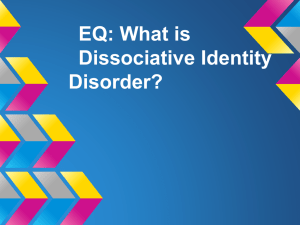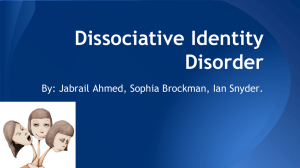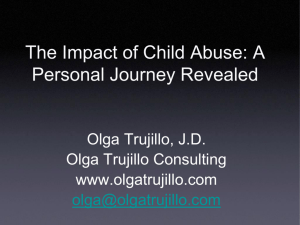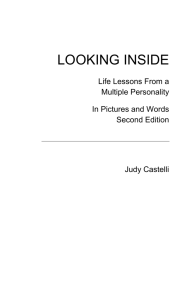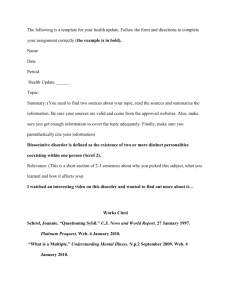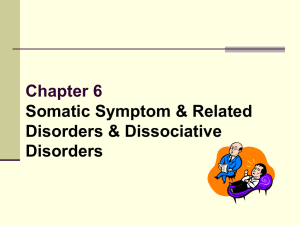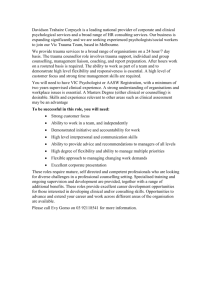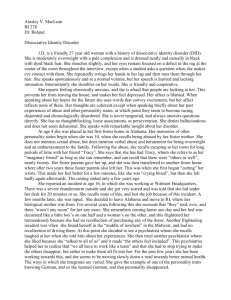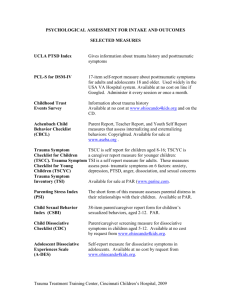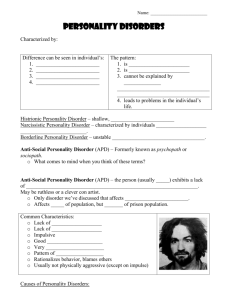Fact File - Healthy Options Library
advertisement
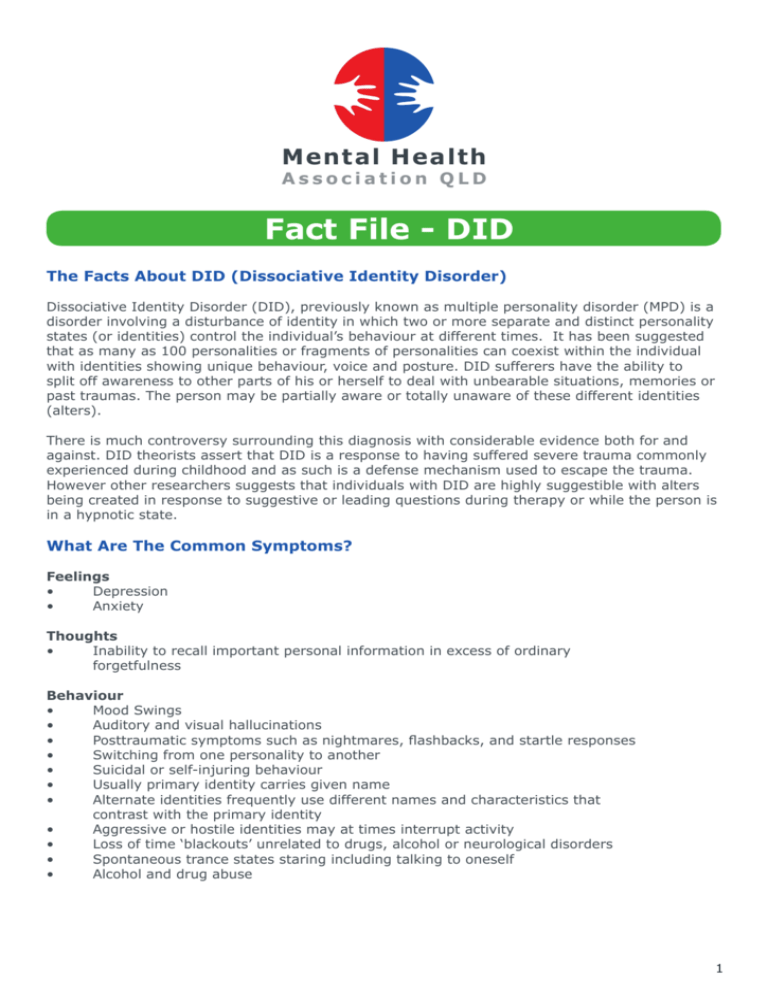
Mental Health Association QLD Fact File - DID The Facts About DID (Dissociative Identity Disorder) Dissociative Identity Disorder (DID), previously known as multiple personality disorder (MPD) is a disorder involving a disturbance of identity in which two or more separate and distinct personality states (or identities) control the individual’s behaviour at different times. It has been suggested that as many as 100 personalities or fragments of personalities can coexist within the individual with identities showing unique behaviour, voice and posture. DID sufferers have the ability to split off awareness to other parts of his or herself to deal with unbearable situations, memories or past traumas. The person may be partially aware or totally unaware of these different identities (alters). There is much controversy surrounding this diagnosis with considerable evidence both for and against. DID theorists assert that DID is a response to having suffered severe trauma commonly experienced during childhood and as such is a defense mechanism used to escape the trauma. However other researchers suggests that individuals with DID are highly suggestible with alters being created in response to suggestive or leading questions during therapy or while the person is in a hypnotic state. What Are The Common Symptoms? Feelings •Depression •Anxiety Thoughts • Inability to recall important personal information in excess of ordinary forgetfulness Behaviour • Mood Swings • Auditory and visual hallucinations • Posttraumatic symptoms such as nightmares, flashbacks, and startle responses • Switching from one personality to another • Suicidal or self-injuring behaviour • Usually primary identity carries given name • Alternate identities frequently use different names and characteristics that contrast with the primary identity • Aggressive or hostile identities may at times interrupt activity • Loss of time ‘blackouts’ unrelated to drugs, alcohol or neurological disorders • Spontaneous trance states staring including talking to oneself • Alcohol and drug abuse 1 What Are The Causes? DID theorists believe that when an individual is faced with severe, and often repeated trauma from which there is no escape such as, physical or sexual abuse, the individual resorts to psychological escape as a defence mechanism. This often occurs before the age of seven, when a child’s personality is being formed. The individual is thought to cope with these events by dissociating themselves from what is going on. Over time, the part of their consciousness that is ‘left behind’ to deal with the traumatic episodes becomes stronger and more defined, until it splits from the main personality altogether. This disorder is extremely rare, and only a few hundred cases have been reported. Dissociative identity disorder is widely viewed as resulting from dissociative mental processes—i.e., the splitting off from conscious awareness and control of thoughts, feelings, memories, and other mental components in response to situations that are painful, disturbing, or somehow unacceptable to the person experiencing them. Biopsychosocial Factors Biological • Females are more likely than males • Research suggests that heritable traits such as responsiveness to stress may increase vulnerability Psychological • History of Mental illness Social • Sexual and/or physical abuse • Past/recent trauma •Stress What Treatment Is Available? Treatment relies on a combination of psychotherapy and in certain cases medication. The aim of psychotherapy is to merge the alters back into the patient’s personality. This can take many years and relapses are common, particularly during times of stress. Once the patient has reclaimed their memories of abuse, any trigger that reminds them of that trauma can bring on a dissociative episode. Treatment options include: • Psychological intervention and/or counselling. • Psychiatric treatment. • Hypnosis - Hypnosis can help the client/patient recall his/her true identity and remember the events of the past. •Medication • Support Groups to provide support and understanding to the individual, friends and family How Can You Help Yourself? It is important for you to take care of yourself and try and do the things that make you feel good. Support groups are a great way of being with others who are going through the same thing as you and can be reassuring and get you connected with others. If you know some of your triggers try to avoid these situations when you are feeling particularly vulnerable. If this in not practical, confide in a close friend who may be able to assist you. Recovery from DID and the associated trauma can be a long and difficult process. The important thing to remember is that recovery can and does happen. 2 How Can Family & Friends Help? When talking to a DID sufferer, always assume that the other alters may be listening. The “host” is not always aware of the other “alters”, and in turn, not all “alters” know each other. Friends and family, have to remember it takes time for many DID sufferers to trust people as they may have been manipulated and abused in the past by people who were in a position of trust, such as parents, friends, teachers and spouses. It is also important to be prepared to repeat things you’ve said to each of the alternate identities. Who Else Can Help? Consult with your GP and ask about a Mental Health Care Plan or contact your local Community Mental Health Service to arrange for an assessment. Australian Psychological Society (APS) toll free 1800 333 497 for a referral to a psychologist who practices in your area 1300 729 686 13 11 14 1300 363 622 1300 224 636 1800 18 SANE 1300 301 300 1800 351 881 1800 551 800 MHAQ mhConnect Info & Referral Service Lifeline 24hr Counselling Salvo Careline 24 hr Counselling Beyondblue 24 hr Info Line (7263) Information Helpline Parent Helpline ARAFMI - 24 hr Family & Friends Support Line Kids Helpline - 24 hr Counselling What Resources Are Available To You? www.accs.qld.edu.au www.health.qld.gov.au/pahospital/mentalhealth/docs/did.pdf www.mifq.org.au www.mmha.org.au www.betterhealth.vic.gov.au/bhcv2/bhcarticles.nsf/pages/Dissociative_identity_ disorder?OpenDocument www.beyondblue.org.au www.sane.org References http://www.britannica.com/EBchecked/topic/397158/dissociative-identity-disorder Barlow, D H & Durand, M V 2005, Abnormal psychology: An integrative approach with CD-DSM IV, 4th edn, Thomson Wadsworth, Belmont, CA 3

